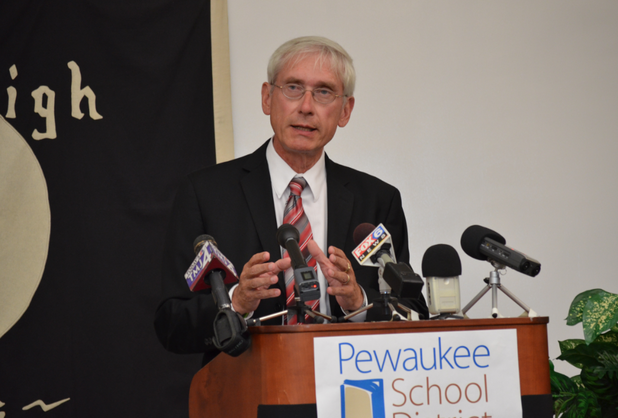
Evers also launched the “Promoting Excellence for All” website to address the state’s chronic achievement gap problems.
by Christian D’Andrea
MacIver Institute Education Policy Analyst
Wisconsin State Superintendent Tony Evers spoke in front of a crowded rotunda at the State Capitol Thursday to deliver his State of Education address. The K-12 czar lauded recent reforms that will improve accountability throughout Wisconsin’s publicly funded schools and derided the state’s ongoing problems with the achievement gap and the problems that local districts face with funding each year.
Evers began his speech by lauding the female leadership in Wisconsin’s schools. The superintendent noted that women helm seven of the state’s 10 largest districts. From there, he recapped the changes that will shape public education in Wisconsin for the 2014-15 school year. This included the statewide launch of the Educator Effectiveness system, changes to the state’s accountability program, and the introduction of new, more comprehensive assessments for K-12 students.
After this overview of the problems the state had already addressed, Evers set his sights on fixing the persistent issues that plague Wisconsin’s schools.
One of the biggest developments from the State of Education speech was Evers’s announcement that the conclusions and strategies drawn up by his 2014 achievement gap task force
were now public. “There is no more pressing issue in Wisconsin than the gap in academic achievement between students of color and their peers,” said Evers. “The educators I appointed to my Achievement Gap Task Force embraced that concept. The results are a report and website that challenge us to implement proven strategies that promote excellence for all and will close gaps among student groups.”
“The task force embraced what was truly best for kids. They understood that poverty matters. However, they also concluded that if we don’t address the issue of race head on, we will fail. Many of their recommendations revolve around the importance of relationships as well as honoring different cultures. I am so pleased with their work. Every school in the state can benefit from using one or more of the ideas they researched.”
Superintendent Evers also took the state’s funding formula to task for failing rural schools and students from economically disadvantaged families, drawing support from a crowd filled with educators.
“The Speaker’s Task Force heard loud and clear what we’ve long known: Our school funding system is broken,” criticized Evers. “Every superintendent in this rotunda will tell you that. Cuts, freezes, caps, and a failure to reform our system have all taken their toll. Increasingly, we see a growing divide among our rural, suburban, and urban school districts. The haves and the have nots.”
Evers plans on fixing that problem through his Fair Funding for Our Future plan, an initiative he has proposed throughout his tenure as the head of K-12 education in the state. That plan would overhaul the state’s funding formulas while increasing general aid and revenue limits throughout Wisconsin.
Superintendent Evers had the support of the educational stakeholders who crowded the rotunda on Thursday, but it has yet to be seen if that enthusiasm will carry over to the state’s lawmakers. Even so, his proactive approach to fixing the state’s chronic problems with the achievement gap should pay off dividends if schools can properly implement the lessons from his Promoting Excellence for All initiative. Evers understands that inequality in the educational value that students receive is one of the biggest issues that this state faces moving forward. Time will tell if the solutions he laid out today in Madison will be truly effective.